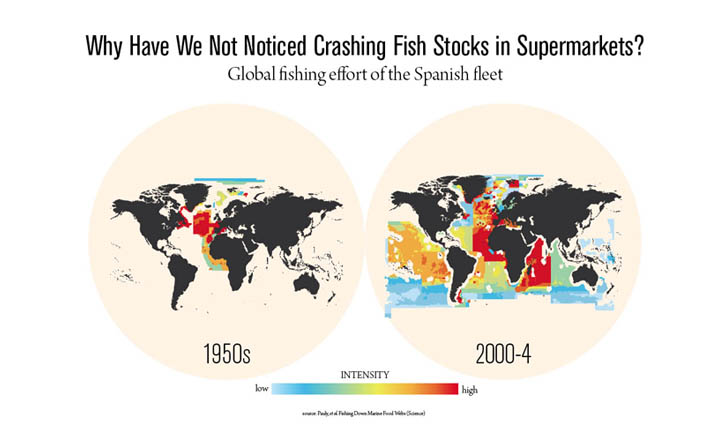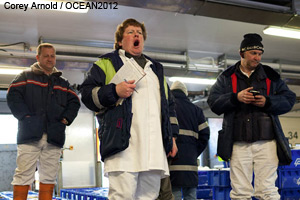How Overfishing Impacts You: It's fish, Captain, but not as we know it!
This briefing published by OCEAN2012 exposes how overfishing impacts the quality of fish people in Europe are eating. It is part of a series of briefings illustrating the impacts of overfishing on people or marine ecosystems caused by the excess removal of millions of tonnes of marine life every year.
This report is avaliable in multiple languages. Download the complete document above.
A great fraud is being committed on an unsuspecting public in some EU member states: fish is being mislabelled and passed off as more expensive or even sustainably caught species. Why is this happening? Our demand for seafood is growing just as the availability of locally caught fish is declining because of overfishing. So the EU needs to import more and more fish, and these cheaper fish are flooding European markets – and often sold to us fraudulently.
Do you know what you're eating?
Did you know that 28 percent of all cod sold in Ireland is fake? Mislabelled pollack, saithe and whiting is passed off as cod – breading, smoking or battering the fillets disguises how the imposters look, smell and taste.
These startling results were discovered when scientists collected random samples of fish bought at fish and chip shops, supermarkets and fishmongers in Ireland and tested the DNA.
The tests also discovered that some fish labelled as ‘sustainably sourced Pacific cod' was actually overfished Atlantic cod. So fraudsters are taking advantage of their customers' desire to buy sustainably caught fish. But the deception doesn't stop there: such widespread fraud is likely to hoodwink many unsuspecting people into thinking that cod stocks from Irish and North Sea waters are healthy because the species appears so readily available.
A designer knows he has achieved perfection not when there is nothing left to add, but when there is nothing left to take away.
Cod is to the Irish and British what hake is to the Spanish. Studies by the University of Oviedo, Spain, in 2004, 2006 and 2010 revealed high levels of mislabelling and species substitution: between 31 and 39 percent of hake was found to be cheaper African hake rather than the more expensive European-caught or American-imported hake. Even though, from a scientific perspective, there is no difference in the quality of the various hake species, Spanish consumers perceive a difference and are willing to pay more for locally caught, fresh hake. Average prices for European hake in 2010 (€11.72/kg) were almost double the price of African hake (€6.79/kg). The EU imports more than 100,000 tonnes of hake a year, of which up to 60 percent goes to Spain to make up for a significant shortfall in supply. Fraudsters cash in by claiming that hake from other parts of the world has been caught in local waters.
Meanwhile in Germany, consumers are buying more, cheaper and poorer quality fish to fill the void left by overfishing. To make up for shortfalls in supplies of traditional cold-water, Northern Atlantic-caught species, Germany's supermarket freezer cabinets are stocked with pangasius, a fish farmed in the warm, fresh and brackish waters of southeast Asia, and also known as Vietnamese river cobbler or striped catfish.
Until seven years ago it was virtually unknown, but now Germany has become a major market and the fish is offered on restaurant menus all over the country. It is now the fifth most purchased fish in Germany. From 1999 to 2009, imports of pangasius into the EU rose steeply from around 2,000 to more than 220,000 tonnes (Figure 2), replacing traditional markets for cod and hake. Some people believe it to be bland, almost devoid of flavour, while others wonder how anyone could expect it to taste of our cold northern seas when it is grown in muddy freshwater and brackish ponds in the rivers and deltas of Southeast Asia? Even so, some consumers have been swindled – in 2009 several UK fish and chip shops were prosecuted for passing pangasius off as cod.
Why is this happening?
Economists and trade analysts do not have to look very far to understand why the EU is importing vast quantities of pangasius and other species. According to researchers, if the EU relied solely on wild-caught fish from European waters to meet its yearly needs, the supply would run out by early July. Overfishing and increasing demand, on average a 15 percent annual increase by EU consumers creates an ever greater shortfall in supply which is made up by fish caught by EU vessels in distant waters, aquaculture and imported fish. It is the pressure on the fishing, processing and retail sector to find new sources of fish products and to keep making profits that creates the incentive to mislabel cheaper fish and sell them as more expensive species. Hiding ‘imposter' fish in processed products such as oven-ready meals covered in sauces or fish-fingers and selling them in supermarkets or take-away outlets is pretty easy because we, as consumers, usually cannot tell the difference.

What can you do about it?
How do we end overfishing? Politicians have responsibility for making the decisions that will end overfishing; citizens have the responsibility of choosing carefully what they eat, and encouraging and supporting their politicians to make those decisions. You can help end overfishing by speaking up and taking action to achieve a far-reaching ecological vision of healthy oceans and sustainable fisheries.







